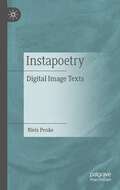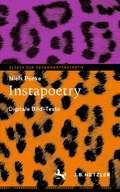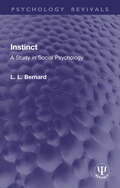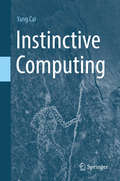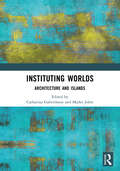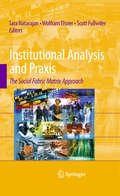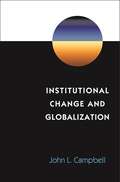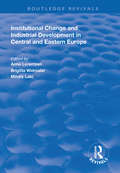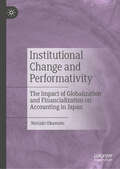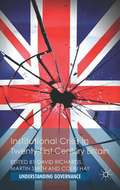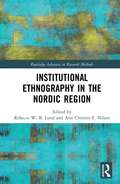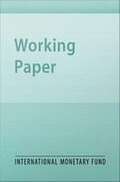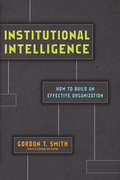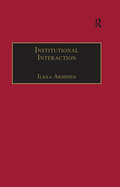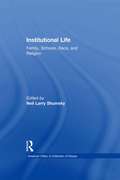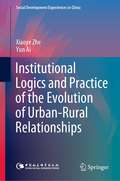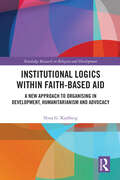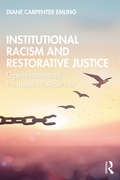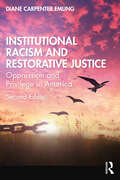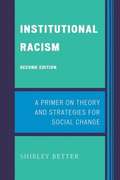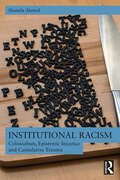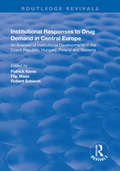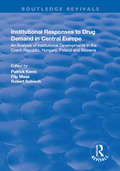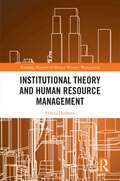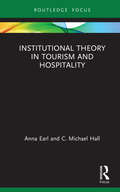- Table View
- List View
Instapoetry: Digital Image Texts
by Niels PenkeInstapoetry is one of the most popular literary phenomena of our time. In just a few years, millions of short to ultra-short texts have been published and shared on Instagram. In the battle for attention with countless other texts, the mechanisms of the platform and the usage routines of the users have to be served. The external pressure on literary production is immense. The book explains the production strategies and reception procedures of Instapoetry, explains its development and locates its significance - somewhere between the last stage of decay and the future of poetry.
Instapoetry: Digitale Bild-Texte (Essays zur Gegenwartsästhetik)
by Niels PenkeInstapoetry zählt zu den populärsten literarischen Phänomenen der Gegenwart. In wenigen Jahren sind Millionen von kurzen bis ultra-kurzen Texten auf Instagram publiziert und geteilt worden. Im Kampf um Aufmerksamkeit mit unzähligen anderen Texten müssen die Mechanismen der Plattform und die Nutzungsroutinen der User bedient werden. Der äußere Druck auf die literarische Produktion ist immens. Das Buch erklärt die Produktionsstrategien und Rezeptionsverfahren von Instapoetry, erläutert ihre Entwicklung und verortet ihre Bedeutung – irgendwo zwischen letzter Verfallsstufe und Zukunft der Lyrik.
Instinct: A Study in Social Psychology (Psychology Revivals)
by L. L. BernardOriginally published in 1925, according to the preface, Instinct: A Study in Social Psychology is the result of many years of interrupted labors that began in a graduate seminar in 1909–1910, when the author attempted to apply Professor McDougall’s classification of instincts to the classification of criminals. The immediate result was the conviction that McDougall’s instincts were habits, and further constructive work found issue in an unpublished report on “Instinct and the Social Sciences,” taking issue with McDougall’s viewpoint regarding the significance of the theory of instincts then prevalent for the social sciences. Finally completed after many years in the making, this work is the result of the author’s investigations on the topic of instinct. Today it can be read in its historical context.This book is a re-issue originally published in 1925. The language used and views portrayed are a reflection of its era and no offence is meant by the Publishers to any reader by this re-publication.
Instinctive Computing
by Yang CaiThis book attempts to connect artificial intelligence to primitive intelligence. It explores the idea that a genuinely intelligent computer will be able to interact naturally with humans. To form this bridge, computers need the ability to recognize, understand and even have instincts similar to humans. The author organizes the book into three parts. He starts by describing primitive problem-solving, discussing topics like default mode, learning, tool-making, pheromones and foraging. Part two then explores behavioral models of instinctive cognition by looking at the perception of motion and event patterns, appearance and gesture, behavioral dynamics, figurative thinking, and creativity. The book concludes by exploring instinctive computing in modern cybernetics, including models of self-awareness, stealth, visual privacy, navigation, autonomy, and survivability. Instinctive Computing reflects upon systematic thinking for designing cyber-physical systems and it would be a stimulating reading for those who are interested in artificial intelligence, cybernetics, ethology, human-computer interaction, data science, computer science, security and privacy, social media, or autonomous robots.
Instituting Worlds: Architecture and Islands
by Catharina Gabrielsson Marko JobstIslands have a long history of appealing to the architectural imagination and have served as sites for architectural expressions of cultural specificity, cultural conquest, and cultural hybridisation over millennia. From offshore financial centres to immigrant detention camps, tourist havens to military bases, the architectures of islands concretise the forces at play in our contemporary, crisis-ridden societies.Collecting writings by a wide range of established scholars together with exciting new voices in architecture and affiliated disciplines, this book shows the pertinence islands hold for critical spatial thinking and practice today. Covering war and colonialism, detention and tourism, the topics raised in this book range from issues of urban development to close readings of buildings – whether ruined, designed, projected, preserved, or absent. Combing case studies, critical historiography, and pieces of experimental writing, the chapters disclose the variety of ways in which architecture can be used as a lens for analysing, disclosing, and untangling island specificity.This volume offers a very timely, vibrant, and methodologically varied approach to the subject of architecture and islands. Its global reach, innovative outlook, and rich material will be of interest to scholars and students in architecture, landscape architecture, geography, and urban design and planning, alongside arts and literary studies.
Institutional Analysis and Praxis
by Wolfram Elsner Scott Fullwiler Tara NatarajanThe Social Fabric Matrix Approach (SFM-A) is a rigorous and holistic methodology for undertaking policy-relevant, complex systems research. This book contains both extensive applications of the SFM-A to contemporary issues and chapters that embed applied research in relevant theoretical, philosophical, and methodological frameworks. It offers a balance of applications through case studies across regions and topics that span areas of finance, development, education, and environment, to name a few. This book creates new ways of using the SFM and forges previously unexplored connections between institutional economics and other areas of study such as financial markets, micro credit, political economy and sustainable development, thus contextually refining the SFM-A. This book complements F. Gregory Hayden's Policymaking for a Good Society: The Social Fabric Matrix Approach to Policy Analysis and Program Evaluation.
Institutional Change and Globalization
by John L. CampbellThis book is about institutional change, how to recognize it, when it occurs, and the mechanisms that cause it to happen. It is the first book to identify problems with the "new institutional analysis," which has emerged as one of the dominant approaches to the study of organizations, economic and political sociology, comparative political economy, politics, and international relations. The book confronts several important problems in institutional analysis, and offers conceptual, methodological, and theoretical tools for resolving them. It argues that the paradigms of institutional analysis--rational choice, organizational, and historical institutionalism--share a set of common analytic problems. Chief among them: failure to define clearly what institutional change is; failure to specify the mechanisms responsible for institutional change; and failure to explain adequately how "ideas" other than self-interests affect institutional change. To demonstrate the utility of his tools for resolving the problems of institutional analysis, Campbell applies them to the phenomenon of globalization. In doing so, he not only corrects serious misunderstandings about globalization, but also develops a new theory of institutional change. This book advances the new institutional analysis by showing how the different paradigms can benefit from constructive dialogue and cross-fertilization.
Institutional Change and Industrial Development in Central and Eastern Europe (Routledge Revivals)
by Anne Lorentzen Brigitta Widmaier Mihály LakiPublished in 1999, this is a collection of recent research results by acknowledged researchers in the field of enterprise transformation and industrial development in Central and Eastern Europe.
Institutional Change and Performativity: The Impact of Globalization and Financialization on Accounting in Japan
by Noriaki OkamotoThis book analyzes the recent development of accounting in Japan from an interdisciplinary perspective, focusing specifically on how institutional reality is constructed. Integrating theoretical perspectives from institutional economics and performativity studies, the book creates a framework to systematically explain institutional changes and dynamics against a backdrop of increasing globalization and financialization. The first part of the book connects Searlean theories of institutional reality and social ontology with studies in performativity, particularly its linguistic aspects, to show how collectively accepted social norms can performatively shape institutions. The second section explores how these patterns can be uniquely traced in the recent history of Japan’s financial accounting standards and institutions, in particular how globalization, financialization, fair value accounting and a shareholder-value primacy form of corporate governance have prevailed. It also explores the establishment of the International Accounting Standards Board (IASB) and the increasing global convergence of accounting standards. The book argues that multiple collectively accepted performative norms can be identified simultaneously in Japanese accounting, as well as discussing how these social dynamisms are identified and dispersed linguistically (such as by researchers and journalists). This book will be of interest to those working in accounting and financial reporting, as well as those working in social studies of finance, economic sociology, and institutional economics.
Institutional Crisis in 21st-Century Britain
by Martin Smith David Richards Colin HayIn 21st century Britain, a 'perfect storm' seems to have engulfed many of its institutions. This book is the first wholesale consideration of the crisis of legitimacy that has taken root in Britain's key institutions and explores the crisis across them to determine if a set of shared underlying pathologies exist to create this collective crisis.
Institutional Ethnography in the Nordic Region (Routledge Advances in Research Methods)
by Rebecca W. B. Lund Ann Christin E. NilsenDeveloped in response to the theoretically driven mainstream sociology, institutional ethnography starts from people’s everyday experiences, and works from there to discover how the social is organized. Starting from experience is a central step in challenging taken-for-granted assumptions and relations of power, whilst responding critically to the neoliberal cost-benefit ideology that has come to permeate welfare institutions and the research sector. This book explicates the Nordic response to institutional ethnography, showing how it has been adapted and interpreted within the theoretical and methodological landscape of social scientific research in the region, as well as the institutional particularities of the Nordic welfare state. Addressing the main topics of concern in the Nordic context, together with the way in which research is undertaken, the authors show how institutional ethnography is combined with different theories and methodologies in order to address particular problematics, as well as examining its standing in relation to contemporary research policy and university reforms. With both theoretical and empirical chapters, this book will appeal to scholars and students of sociology, professional studies and anthropology with interests in research methods and the Nordic region.
Institutional Intelligence: How to Build an Effective Organization
by Gordon T. SmithWe tend to view institutions cynically, but they are essential to human flourishing and thriving communities. Focusing on the non-profit sector, Gordon Smith unpacks the core of institutional intelligence, showing team leaders, directors, executives, board members, and employees how to work effectively within the institutional character of their organizations.
Institutional Interaction: Studies of Talk at Work (Directions in Ethnomethodology and Conversation Analysis)
by Ilkka ArminenInstitutional Interaction focuses on talk and interaction in institutional contexts. The first systematic book-length study on this expanding area, it discusses the theory and methodology of conversation analysis, focusing on studies of institutional interaction, before examining the basics of institutional interaction in selected fields. Cutting-edge new applications are assessed, such as human-computer interaction, the role of ethnography, statistics and the relationship of institutional talk to ordinary talk. Accessibly written and carefully structured to provide a sophisticated introduction to conversation analysis applied in institutional settings, the book offers a wealth of examples ranging from the classroom, to the courtroom, to the doctor's surgery. The book also features helpful suggestions for further reading, designed to appeal to students and academics in socio-linguistics, social psychology, organizational studies, management and information systems and applied linguistics.
Institutional Life: Family, Schools, Race, and Religion (Essays on Mexico Central South America)
by Neil Larry ShumskyFirst Published in 1996. Volume 8 in the 8-volume series titled American Cities: A Collection of Essays. This series brings together more than 200 scholarly articles pertaining to the history and development of urban life in the United States during the past two centuries. Volume 8 discusses several institutions that are uniquely urban: voluntary associations, vigilance committees, and organized police forces. These articles attempt to consider race and ethnicity class, gender, and the various experiences of different groups of Americans.
Institutional Logics and Practice of the Evolution of Urban–Rural Relationships (Social Development Experiences in China)
by Xiaoye Zhe Yun AiThis book mainly analyzes the major issues at all phases of the transition of urban-rural relation, as well as measures adopted by the transition launcher in face of such issues, including not only the system and policy design of the national and local government, but the countermeasures of basic-level units at urban and rural areas and the people. Through reference of the social structure and social behavior, it proposes “opportunity structures”, “interactive mechanism” and “behavior strategies” for different periods, which to some degree promotes the transition of urban-rural relation and brings in new, more complicated issues for the development. It is under the impact of such new and existing issues that big problem follows when the urban-rural relation steps onto a new stage, showing several paths and practices different from the general urbanization and modernization theories.
Institutional Logics within Faith-Based Aid: A New Approach to Organising in Development, Humanitarianism and Advocacy (Routledge Research in Religion and Development)
by Nina G. KurlbergThis book investigates what faith means in the actual day-to-day practice of faith-based NGOs working in the development, humanitarian, and advocacy sectors.Faith-based organisations play an extremely prominent role in international aid and development, operating within the same sphere as organisations without an explicit religious affiliation. This book uses the case study of a UK-based Christian faith-based organisation to develop an analytic tool using institutional logics. Through exploration of how various institutional logics are manifested and negotiated across organisational practice, the book describes how the ‘telos,’ or objective, of the corporate logic (to sustain the organisation) interacts with the telos of the religious logic (namely, to worship God). The book demonstrates that since organisational practices must ultimately work to sustain the organisation, at the organisational level faith is restricted to certain spaces and forms, while at the individual level faith is dominant and active.Bringing a fresh perspective to discussions of religion and development by highlighting how faith influences development at the organisational level, this book will be an important read for researchers working on global development.
Institutional Racism and Restorative Justice: Oppression and Privilege in America
by Diane C EmlingInvisible, intractable and deadly—such is the nature of institutional racism. But are there mitigating actions that society could take against them? Diane Carpenter Emling explores this question in Institutional Racism and Restorative Justice: Oppression and Privilege in America. Moving beyond the immediate sources and consequences of prejudice, racism and inequality, to thoroughly assess approaches to restorative justice, Emling details America’s complex history of racism, demonstrating how it becomes embedded in society through land ownership, housing, education, health care, employment, public services and criminal justice. For each of these issues, she suggests actions to restore justice. But societies don’t operate institution by institution, and extraordinary changes will be necessary to address systemic racism. Directed at college undergraduate students, Emling’s book offers a valued contribution for teaching courses in African American studies, sociology, economics, politics and American history. Written in a comprehensive and accessible style, this book offers a much-needed perspective in the literature on institutional racism.
Institutional Racism and Restorative Justice: Oppression and Privilege in America
by Diane Carpenter EmlingInvisible, intractable, and deadly— such is the nature of institutional racism. But are there mitigating actions that society could take against it? Diane Carpenter Emling explores this question in Institutional Racism and Restorative Justice: Oppression and Privilege in America. Moving beyond the immediate sources and consequences of prejudice, racism, and inequality to thoroughly assess approaches to restorative justice, Emling details America’s complex history of racism, demonstrating how it becomes embedded in society through land ownership, housing, education, health care, employment, public services, and criminal justice. For each of these issues, she suggests actions to restore justice. But societies don’t operate institution by institution, and extraordinary changes will be necessary to address systemic racism. Directed at college undergraduate students, Emling’s book offers a valueable contribution for teaching courses in African-American studies, sociology, economics, politics, and American history. Written in a comprehensive and accessible style, this book offers a much-needed perspective in the literature on institutional racism. This new edition includes important accounts and analysis of the political and social upheavals following the Georgy Floyd killing and subsequent demonstrations, the cultural battle over Critical Race Theory, and the foregrounding of race in American politics and institutions.
Institutional Racism: A Primer on Theory and Strategies for Social Change (Second Edition)
by Shirley BetterMany people associate racism with bigoted individuals and radical groups on the fringes of society. Shirley Better argues that racism is much larger than negative attitudes and that it touches the very core of our lives as Americans. In this enhanced second edition, Better explores the historical origins of institutional racism, details its devastating effects on contemporary society such as the aftermath of Hurricane Katrina, and outlines real possibilities for social, political, and economic change in the 21st century. Racism persists because dominant groups are unwilling to acknowledge, let alone give up, the benefits of whiteness. Through numerous examples, Institutional Racism demonstrates how inequality and racial exclusion are embedded within the fabric of American society. Better explores how racism has restricted equal access to educational opportunities, employment, and housing, and she considers the influence of racism in the criminal justice system. Beyond detailing the sometimes subtle institutional causes and pernicious effects of racism, Better offers numerous strategies for individuals and groups as they seek to combat this pervasive social problem. Institutional Racism is a must read for those whose seek to understand the underpinnings of racism and for everyone interested in the practical possibilities of racial pluralism and equality in the United States.
Institutional Racism: Colonialism, Epistemic Injustice and Cumulative Trauma
by Shamila AhmedInstitutional Racism explores the role of colonialism, truth, and knowledge in creating and maintaining institutional racism. It documents how the manipulation of truth and knowledge facilitated colonialism and epistemicide to create a perpetrator perspective of institutional racism that maintains the illusionary status of equality and justice and continues to conceal the breadth and depth of victimisation.The chapters present an understanding of how epistemicide, critical race theory, post-colonialism, white racial frames, white privilege, and insidious trauma can be used to critique the discourses and mechanisms that sustain a perpetrator perspective of institutional racism and how these concepts facilitate a victim perspective of institutional racism that documents the cumulative psychological and physical harms of institutional racism. The second half of the book provides grounded case studies of institutional racism in the areas of education, policing, the war on terror, and Covid 19 to demonstrate how contemporary processes of colonialism and epistemicide maintain and reinforce institutional racism to negatively impact physical and mental health and contribute to cumulative trauma.This book will be of great interest to students and scholars of criminology, sociology, criminal justice, history, law, and politics, and those studying race, ethnicity, and racism, as well as anyone interested in learning about racism, structural inequality, and institutional racism.
Institutional Responses to Drug Demand in Central Europe (Public Policy And Social Welfare Ser. #Vol. 27)
by Flip MaasThis title was first first published in 2002: Understanding the link between institutional contexts and drug problems is crucial to the process of developing appropriate drug policies and drug demand reduction strategies. However, this link is too often taken for granted, with most drug-related research relying on epidemiological, bio-medical or clinical approaches, ignoring the social contexts in which drug use finds its causes and where its consequences are most visible and hardest felt. This book analyses the institutional responses to the drug problem in the States of Central and Eastern Europe, providing conclusive evidence that the drug problem is a social one and that its causes emerge from a broad array of social factors. Charting the changing policy perceptions and attitudes towards drugs and related problems alongside new organizations designed to counteract drug-related problems, the book provides important new insights into one of the most important problems confronting nations around the world.
Institutional Responses to Drug Demand in Central Europe (Routledge Revivals #Vol. 27)
by Flip MaasThis title was first first published in 2002: Understanding the link between institutional contexts and drug problems is crucial to the process of developing appropriate drug policies and drug demand reduction strategies. However, this link is too often taken for granted, with most drug-related research relying on epidemiological, bio-medical or clinical approaches, ignoring the social contexts in which drug use finds its causes and where its consequences are most visible and hardest felt. This book analyses the institutional responses to the drug problem in the States of Central and Eastern Europe, providing conclusive evidence that the drug problem is a social one and that its causes emerge from a broad array of social factors. Charting the changing policy perceptions and attitudes towards drugs and related problems alongside new organizations designed to counteract drug-related problems, the book provides important new insights into one of the most important problems confronting nations around the world.
Institutional Theory and Human Resource Management (Routledge Research in Human Resource Management)
by Alireza HashemiThis research volume delves into the intricate realm of human resource management (HRM) through the lens of institutional theory.Spanning eight chapters, it meticulously explores the intersection of organizational studies and HRM, offering a deep understanding of how institutional contexts shape HRM practices and behaviors. Readers will gain a comprehensive understanding of the contextual approach in HRM and its linkage with institutional theory. By leveraging the insights provided, they can enhance their analytical skills, enrich their understanding of institutional complexities, and design effective HRM strategies tailored to organizational contexts. Key topics covered include institutional pressure, logic, action, response, work, and entrepreneurship in HRM, as well as micro-institutions and multi-level HRM approaches.This book will be of value to academics, researchers, and practitioners in the field of HRM seeking to deepen their understanding of the institutional underpinnings of HRM. It is also invaluable for advanced students studying HRM, organizational studies, or related disciplines, providing them with a solid theoretical foundation and practical insights for navigating the complexities of HRM in real-world contexts.
Institutional Theory in Tourism and Hospitality (Routledge Focus on Tourism and Hospitality Research)
by C. Michael Hall Anna EarlInstitutions are fundamental aspects for driving tourism and hospitality globally. They are the socio-economic "rules of the game" that serve to shape and constrain human and organisational interactions. This book is the first of its kind to provide a comprehensive overview of institutional theory in a tourism and hospitality context. The complexity and multiple scaled nature of the institutional environment plays a crucial role in the development and formation of tourism destinations, attractions, organisations, and businesses, as well as influencing the activities of individuals. Institutional theory therefore provides a means to understand the complexity and processes of change at different scales of analysis and provides insights into the organisational and political basis of tourism policy development and implementation. Chapters introduce and expand on institutional analysis in tourism and hospitality, institutional theory in the social sciences, methodological issues, and future directions in institutional analysis in tourism and hospitality, making use of case studies throughout. This book will appeal to students of tourism, hospitality, leisure, and events, as well as other social science disciplines. Providing a comprehensive overview of and guide to the application of institutional theory, this book will serve as a complete reference to institutional theory in a tourism and hospitality setting for years to come.
